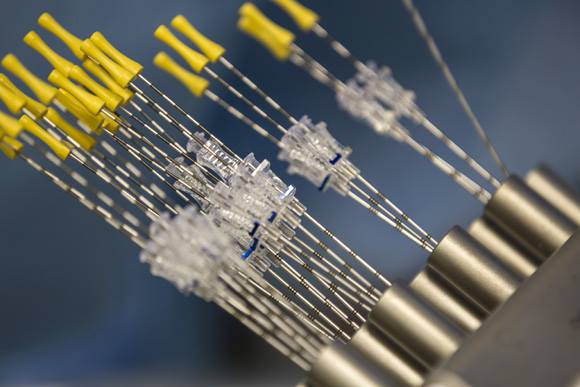Rosnano left the project for the production of micro sources for the treatment of cancer
Rosnano announced the withdrawal from the capital of the portfolio company Bebig. It is the only Russian producer of micro sources for low-dose brachytherapy for prostate cancer. Over the year, Bebig produced 10,000 micro sources, with the help of which in 2014, 1,200 operations were performed in Russia.
A new method of treatment entered the practice of 26 medical centers of Russia.

Prostate cancer is a malignant tumor, it occurs in every seventh man over fifty years of age. Annually, up to four hundred thousand cases of such neoplasms in men are detected in the world, in some countries it takes the second and third places after lung cancer and stomach cancer. In 2014, more than thirty-six thousand patients were diagnosed in Russia, and the mortality rate in the first year since the diagnosis was established is 10.3%. Brachytherapy is a gentle, alternative to surgical intervention and external irradiation method for patients with stage I and II oncology.
')
Brachytherapy was first used in 1910, doctors introduced radium-226 capsules into the prostate gland through the urethra. In 1917, in the USA, micro sources were introduced into the gland through needles, and in 1930 radioactive gold was used as an implant. In 1981, H. Holm and J. Gammelgard applied the technology of implantation of iodine micro-sources 125 into prostate tissue under the control of transrectal scanning (TRUS), and this technique became the basis of a new brachytherapy technology.
In August 2015, Bebig reported on the release of more than ten thousand micro sources for the treatment of prostate cancer. The only plant for the production of these micro sources in Russia and the CIS works at the Joint Institute for Nuclear Research in the city of Dubna, Moscow Region.
Rosnano invested 496 million rubles in the production of micro-sources Bebig , and received , taking into account the repayment of loans, interest on loans issued and profits from the sale of shares, more than 670 million rubles.
A new method of treatment entered the practice of 26 medical centers of Russia.

Prostate cancer is a malignant tumor, it occurs in every seventh man over fifty years of age. Annually, up to four hundred thousand cases of such neoplasms in men are detected in the world, in some countries it takes the second and third places after lung cancer and stomach cancer. In 2014, more than thirty-six thousand patients were diagnosed in Russia, and the mortality rate in the first year since the diagnosis was established is 10.3%. Brachytherapy is a gentle, alternative to surgical intervention and external irradiation method for patients with stage I and II oncology.
')
Brachytherapy was first used in 1910, doctors introduced radium-226 capsules into the prostate gland through the urethra. In 1917, in the USA, micro sources were introduced into the gland through needles, and in 1930 radioactive gold was used as an implant. In 1981, H. Holm and J. Gammelgard applied the technology of implantation of iodine micro-sources 125 into prostate tissue under the control of transrectal scanning (TRUS), and this technique became the basis of a new brachytherapy technology.
In August 2015, Bebig reported on the release of more than ten thousand micro sources for the treatment of prostate cancer. The only plant for the production of these micro sources in Russia and the CIS works at the Joint Institute for Nuclear Research in the city of Dubna, Moscow Region.
Rosnano invested 496 million rubles in the production of micro-sources Bebig , and received , taking into account the repayment of loans, interest on loans issued and profits from the sale of shares, more than 670 million rubles.
Source: https://habr.com/ru/post/368667/
All Articles